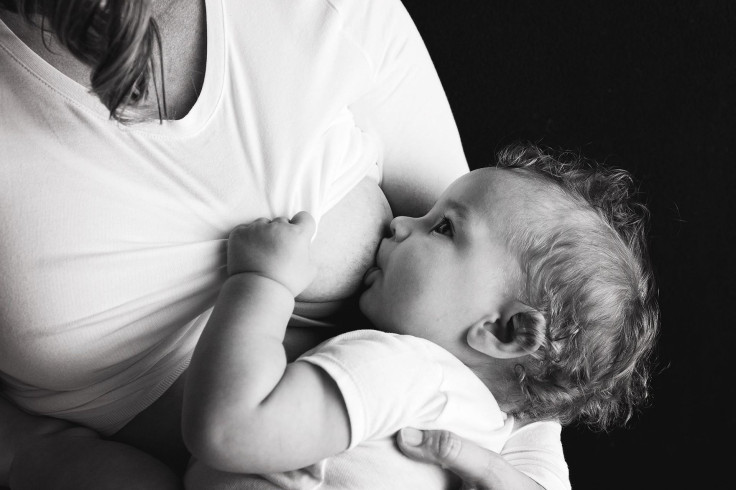5 Breastfeeding Myths Debunked, From Watch What You Eat To Nipple Shape
Today marks the last day of the UN’s World Breastfeeding Week, a celebration of a behavior that has been around as long as babies, and currently practiced by over 80 percent of American mothers. Despite its popularity, breastfeeding myths abound. We've debunked five of these myths to help you get a better idea of what you should expect and what’s just not true.
Breastfeeding Is Meant To Hurt
One of the most widespread myths surrounding breastfeeding is that it's meant to hurt or be uncomfortable throughout the entire process. However, according to Kids Health, if the baby is latched onto the breast correctly, there should be no pain. While there may be an initial 30 seconds to a minute of discomfort caused by the nipple being pulled into the baby’s mouth, extended periods of pain during breastfeeding are usually caused by poor latching.
Read: Why Does Breastfeeding Burn So Many Calories?
The most common reason babies don't latch correctly involves getting only the nipple, and not any of the areola, in their mouths, which causes them to suck without getting much milk, Parenting reported. On the mother’s end, this can cause a painful pinch on the nipples, and also increases the risk of cracked nipples.

Breastfeeding Is Exhausting
Yes, breastfeeding does burn an extra 300 to 500 calories a day, which can cause exhaustion if mothers are not meeting their daily energy intake. However, The Bump reports that much of the exhaustion associated with breastfeeding is caused by extenuating factors. For example, the time commitment of breastfeeding, with some newborns eating up to 12 times a day, can be a lot for mothers to keep up with. In addition, the simple stress of new motherhood can cause some mothers to succumb more easily to exhaustion than mothers who have a better support system or who know what to expect with motherhood.
You Have To Watch What You Eat
Yes, it’s true that whatever you eat or drink can make its way back to your baby. For this reason, it’s important to stay hydrated and consume a healthy balanced diet. But some women believe you also have to stay away from caffeine, alcohol, and even cow’s milk. However, Baby Center reports that you can still enjoy eating and drinking what you like while breastfeeding, as long as you ensure it's in moderation.
For example, while large amounts of caffeine can make a baby irritable, a coffee a day will do no harm. Same goes for alcohol. Once the alcohol is out of your bloodstream, it’s out of your milk supply, and there’s no evidence that small amounts of alcohol, as in a drink or two a week, do any harm to breastfeeding babies, Baby Center reported.
Every Woman Can Breastfeed
Not every woman is capable of breastfeeding, with a number of physical problems at play. For example, hormone imbalance and problems due to past breast surgery can both cause women to be unable to produce enough milk to adequately feed their child, Wendy Wisner, a lactation consultant, wrote on her website.
There is also a condition known as hypoplasia, or insufficient glandular tissue, where women do not grow enough mammary gland tissues, so they can't effectively breastfeed, the San Diego Breastfeeding Center reported. However, nipple shape does not affect a woman’s ability to breastfeed. Long nipples, short nipples, flat or even inverted nipples usually do not interfere with a baby’s ability to breastfeed, La Leche League International reported.
Breastfeeding Makes Your Breasts Sag
Finally, let us address the elephant in the room: breastfeeding ruins your breasts. Yes, breastfeeding can change the shape of your breasts, but according to WebMD, it has nothing to do with whether or not your breasts will sag. This is based on genetics or large amounts of weight gain and weight loss.
Breastfeeding changes the amount of dense fatty tissue and connective tissue in your breasts, which could cause them to stay large post-breastfeeding or shrink. But, if you’re worried that it may cause them to begin to drop, sleep well. They’d likely be doing that regardless of your life choices.
See Also:
Benefits Of Breastfeeding Are Not Limited To The Baby
Breastfeeding May Protect Babies From Inflammation, Ultimately Heart Disease In Adulthood



























